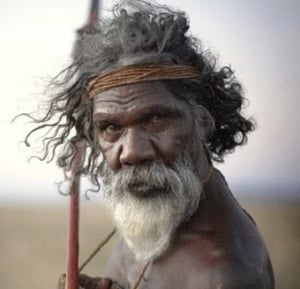Mental health statistics show Aboriginal people are much more likely to suffer from depression or dementia than other Australians.
Selected statistics
- >30% - Percentage of Aboriginal people who are suffering from some form of psychological distress; same figure for all Australians: 20% [8].
- 12.4% - Percentage of Aboriginal people aged over 45 years with dementia. Same rate for non-Aboriginal people: 2.6%
- 10 - Times Aboriginal people living in remote communities are more likely to develop dementia than people living in countries such as Africa, India or Indonesia
Mental health worsens “dramatically”
A report in 2014 found “dramatic” increases in Aboriginal rates of youth suicide, anxiety and depression, as well as cognitive disability and mental health among offenders, and perinatal mental health.
Government programs need to take a long-term view rather than employ quick “start and stop” programmes or provide too narrowly focused and inadequate mental health services. 
Aboriginal mental health and suicide still need to be researched more.
Improving mental health outcomes will have a flow-on effect to other areas, including reducing high incarceration and substance abuse rates.
Risk and protective factors for Aboriginal mental health
The following risk factors are interconnected, and a person with mental illness might show any number of them.
- Widespread grief and loss. This includes grief about the loss of culture, land, connection, and many more areas, often connected to the history of invasion.
- Stolen children. The impact of the past Stolen Generations and ongoing removal of children puts a lot of mental pressure on people, especially when government departments just follow procedures.
- Unresolved trauma. Trauma is a huge factor in Aboriginal health and an agent for many health conditions. If unresolved, trauma can debilitate a person and be passed on to the next generation.
- Loss of identity & culture. When Aboriginal people are separated from their culture and identity, for example when they don’t live on their traditional homelands or don’t know where they are coming from, they don’t feel complete or search for who they are.
- Discrimination and racism. Discrimination based on race or culture, as well as racism, can have a huge impact on any person’s mental health.
- Few economic opportunities. Due to other factors, many Aboriginal people are economically and socially disadvantaged. If you have to constantly worry about finance or how you are perceived by others, this worry contributes to mental illness.
- Poor physical health. Physical health problems contribute to the feeling of inadequacy and exclusion, and some people might stop socialising or exercising. 23% of Aboriginal people reported having both a mental health condition and one or more other long-term health conditions.
This article was originally published by Creative Spirits. Continue reading the entire piece here.
Interested in Aboriginal and Torres Strait Islander Mental Health?
Find out more at the upcoming 2020 International Mental Health Conference, held from 29-31 July at RACV Royal Pines Resort, Gold Coast.
Download the program here.